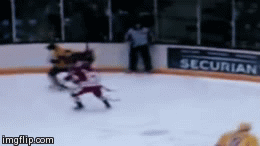But today we were informed that Wisconsin men's hockey player Eddie Wittchow will receive a two game suspension for his hit to the head in Saturday's game.
The quality of this video isn't great since, you know, women's hockey is never televised, but here you'll see Minnesota's Dani Cameranesi and Wisconsin's Mellissa Channell get tangled up and hit the ice. Then you'll see Cameraniesi deliver a cross-check to Channell's head. No penalty is called.

The sequence that follows this is that Channell is unable to get off the ice. She kind of stumbles around the ice and falls down two more times before actually tripping a Gopher and receiving a penalty of her own. That penalty needed to be served by a different Badger as Channell left the ice. She didn't return. She also didn't play in Wisconsin's two games this past weekend because she had a "head injury" (Read: concussion).
Now here's Wittchow (and the ensuing brawl)
The thing is, are they very different? Clearly both were intentional. The two biggest differences are that Cameranesi received no punishment of any kind and that Channell was injured on the play. The Minnesota player in Wittchow's exchange is not.
Look, there will always be inconsistencies in refereeing and I try my best not to use them as an excuse to complain too much. But this is a glaring gulf and it led to a player having brain issues, so it feels like it should be addressed.
There's a ref just feet from Cameranesi and Channell. What was he watching? What purpose does he serve if not to make sure that players aren't receiving checks to the back of their heads?
(To be clear, I'm not picking on Cameranesi here - there were plenty of other plays on both sides of this game that weren't clean and should have been called. I don't think she's dirty and I don't want this to be about her specifically.)
The only reason this at all becomes any sort of men's versus women's issue is that the lack of experienced refs in women's college hockey is a long, exhausted argument. They aren't trained, developed and honed in the way that they are on the men's side. Is that why this play was missed? I don't know. But I know that Wittchow's hit was reviewed and he was charged appropriately.
No one can go back and call a penalty in Channell's case, but I find it disappointing that the WCHA didn't review anything after a player was too injured to serve her own penalty. Why wasn't that a red flag?
I was told WCHA officials were in the house for that series. I hope they were as appalled by the refs as we all were and then highly embarrassed.
